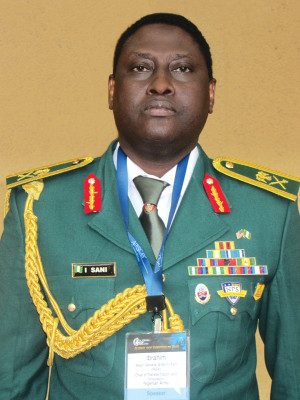
Maj. Gen. Ibrahim Sani, chief of transformation and innovation for the Nigerian Army, said his country is countering the threat of Boko Haram and other asymmetric threats by “thinking outside the box.” The military is taking the fight to what he calls “dark networks” of terrorists with a combination of technology, improved training and a newly created Nigerian Army Special Operations Command (NASOC).
Speaking to ADF in February 2015 at the Global Special Operations Forces Foundation conference in St. Petersburg, Florida, Sani said his job is to look for innovative solutions to emerging threats. “I look at administration, I look at operations, I look at logistics, I look at everything you can think of and ask, ‘What does the Nigerian Army require to be able to meet the current challenges?’” he said. “Once I don’t see it, I look at the possibility of how to go about it.”
Technology: Among the latest technology his office has worked to introduce is the Nigerian Army Low Altitude Platform Station. This balloon-based platform has a surveillance range of 5 kilometers and provides real-time images to Army units. The Army also is introducing a mobile remote sensing device known as a TM-1. This unit can detect human-borne improvised explosive devices (IEDs) or suicide vests from a distance of 500 meters or more. The plan is to have these available at all military checkpoints and control points.
To gather data from the widest range of sources, the Army has set up the Nigerian Army Information Processing Center. This open-source data collection center asks the public to call, email or send text messages to alert the Army of emergencies or terrorist activity. In addition to gathering information about security threats, the center lets citizens report unprofessional conduct by Soldiers without fear of retribution.
“Whatever we get from the public, we collect, analyze and within 15 minutes we send it to the location, to the formation or unit where the emergency is occurring,” Sani said. So we get on-the-spot information of what is happening in real time at a distance.”
NASOC: The Nigerian military is standing up a Special Operations Force composed of fewer than 1,500 highly trained Soldiers. The five- to 10-year process began in 2014 with help from U.S. Special Operations Command Africa. The military will select and train the fighting force with an emphasis on speed, precision and low-visibility operations.
“Humans are more important than hardware and quality is more important than quantity, and they cannot be mass-produced,” Sani said. “If you have 5,000 guys who apply, if you are lucky you might get 500.”
Training: To combat IEDs, Nigeria worked with the U.S. Office of Security Cooperation to produce a handbook on how to detect and disable explosives, and it has expanded training on asymmetric warfare. At border checkpoints, Nigeria is employing the “cluster approach” in which a group comprised of individuals from various government agencies, the military, police, customs and immigration are trained together and work together at an outpost. “The approach has brought about the integration of all relevant agencies in training and the conduct of operations,” Sani said. “On the whole, we are embarking on new forms of training with customs, immigration, state security and police. So each one, we are integrating them, enhancing their responsibilities and their constitutional tasks.”
